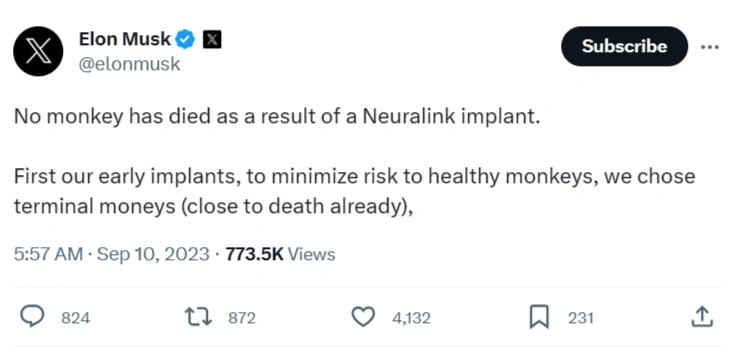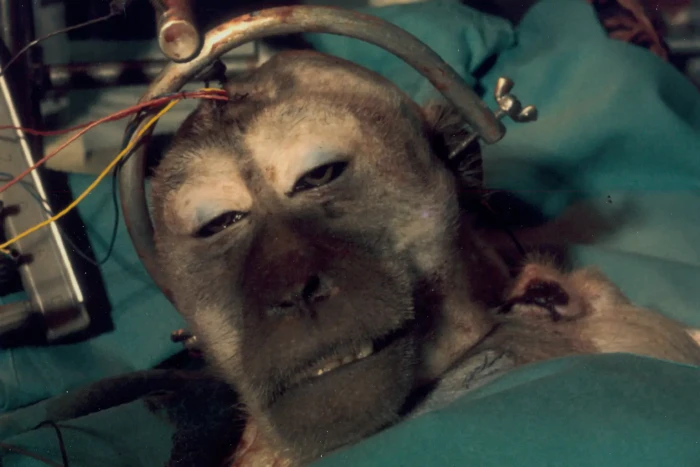Elon Musk has been caught in another lie… and, as per usual, doesn’t care!
Elon Musk recently made statements suggesting that the monkeys involved in Neuralink trials were already close to death, implying that their deaths were not caused by the brain implants. Musk outright claimed each monkey was already terminally ill when it arrived at his company for research purposes.

However, a new investigation by Wired and testimony from a former employee contradict Musk’s claims and raise serious concerns about the safety of Neuralink’s devices. These findings come at a critical time as Neuralink has announced its plans to recruit human subjects for trials.
Whether Musk’s Neuralink device is safe for human testing is not particularly relevant to us at Dakoa. After all, humans can give consent and be compensated; accordingly, animals cannot. Lab testing on an animal is torture whereas similar tests on a person, whether terminally ill, imprisoned, or simply desperate, can be an opportunity. Human testing must adhere to strict guidelines that guarantee things like pain management, hygiene, and proper treatment. Animal testing has no such requirements.
According to veterinary records obtained from the California National Primate Research Center (CNPRC) at UC Davis, where the Neuralink primate research took place, many monkeys experienced tragic outcomes after receiving a Neuralink implant. These include brain swelling and partial paralysis.
One distressing case involved a monkey named “Animal 20.” During surgery in December 2019, a part of the brain implant broke off internally. Later, the monkey scratched the implant site, causing bleeding and partially dislodging the implant.
Despite discovering an infection at the wound, it was impossible to treat due to the implant’s placement. As a result, the monkey had to be euthanized the following month.
Another female monkey, designated as “Animal 15,” began exhibiting abnormal behavior after receiving the brain implant. She pressed her head against the ground, picked at the site until it bled, and eventually lost coordination. Scientists discovered she had brain bleeding, leading to her euthanization in March 2019.
In March 2020, a primate known as “Animal 22” had to be put down when its brain implant became so loose that the screws attaching it to the skull could be easily lifted out, according to a necropsy report.
All of these cases contradicts Musk’s claims that no monkeys died directly due to Neuralink implants.
A former Neuralink employee dismissed Musk’s assertion that the monkeys were already terminally ill, calling it a “straight-up fabrication” and even “ridiculous”.
More To Discover
“We had these monkeys for a year or so before any surgery was performed,” the ex-employee said.
An anonymous scientist conducting research at CNPRC supported these allegations, stating that it was unlikely for these young monkeys to be terminally ill.
The testimony of an anonymous scientist conducting research at CNPRC seems to corroborate the ex-employee’s allegations.
“These are pretty young monkeys,” an anonymous scientist conducting research at CNPRC, corroborates the ex-employee’s allegations. “It’s hard to imagine these monkeys, who were not adults, were terminal for some reason.”
In general, all of us at Dakoa believe that we, as people, who can communicate and understand should have the opportunity to decide whether to take part in research and testing of new technologies and drugs with fair compensation. Animals cannot consent and cannot be compensated.
Today, we have sophisticated computer software and simulation technologies, the need for animal testing has passed. Musk’s Neuralink chose to test on monkeys simply because it’s faster and cheaper.
In total (from what we know) 15 of 23 monkeys died from Neuralink testing. That’s a staggering 65% mortality rate at Neuralink. And those were only the monkeys!
To date the company has killed around 1,500 animals, including hundreds of sheep and pigs since 2018, according to records reviewed by Reuters, BBC and sources with direct knowledge of the company’s animal-testing operations.



















